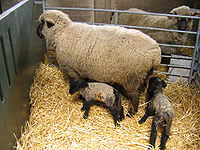
Oxford sheep
Encyclopedia

England
England is a country that is part of the United Kingdom. It shares land borders with Scotland to the north and Wales to the west; the Irish Sea is to the north west, the Celtic Sea to the south west, with the North Sea to the east and the English Channel to the south separating it from continental...
breed developed in the 1830s by crossing the Cotswold
Cotswold sheep
Cotswold sheep are a breed of domestic sheep originating in the Cotswold hills of the southern midlands of England. It is a dual-use breed providing both meat and wool...
with a forerunner of the Hampshire
Hampshire sheep
The Hampshire or Hampshire Down is a breed of sheep which originated around 1829 from a cross of Southdowns with the Old Hampshire breed, the Wiltshire Horn, and the Berkshire Nott, all horned, white-faced sheep — these were native to the open, untilled, hilly stretch of land known as the Hampshire...
, and using the resulting cross-breeds
Crossbreed
A crossbreed or crossbred usually refers to an animal with purebred parents of two different breeds, varieties, or populations. Crossbreeding refers to the process of breeding such an animal, often with the intention to create offspring that share the traits of both parent lineages, or producing...
to form the basis of the present-day breed. This breed is primarily raised for meat.
The fleece
Wool
Wool is the textile fiber obtained from sheep and certain other animals, including cashmere from goats, mohair from goats, qiviut from muskoxen, vicuña, alpaca, camel from animals in the camel family, and angora from rabbits....
of the Oxford is short, relatively large-bodied, hornless, has a brown face and legs covered in light brown wool
Wool
Wool is the textile fiber obtained from sheep and certain other animals, including cashmere from goats, mohair from goats, qiviut from muskoxen, vicuña, alpaca, camel from animals in the camel family, and angora from rabbits....
. The Oxford produces the heaviest fleece of any of the Down breeds. The breed's capacity to produce a large, meaty carcase
Carrion
Carrion refers to the carcass of a dead animal. Carrion is an important food source for large carnivores and omnivores in most ecosystems. Examples of carrion-eaters include vultures, hawks, eagles, hyenas, Virginia Opossum, Tasmanian Devils, coyotes, Komodo dragons, and burying beetles...
for further processing has stimulated interest from the meat industry, and it also grows the most wool of any of the terminal sire breeds.

